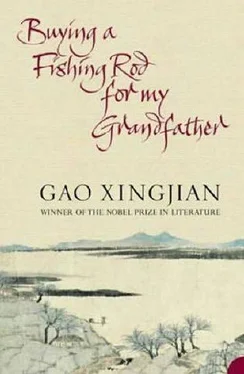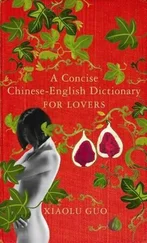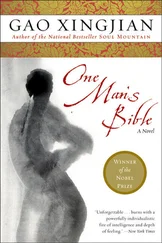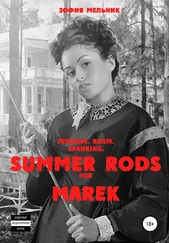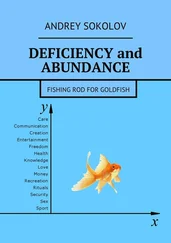"Excuse me, could you tell me how to get to the county hostel?" I asked.
He looked at Fangfang and me for a moment, then enthusiastically pointed it out to us. "Go that way," he told us, "then head left. The red three-story brick building is the county hostel." He asked whom we were looking for, and seemed to want to take us there himself. We explained that we were tourists passing through and asked if there were any sights worth seeing. He patted his head: this, it seemed, was a problem.
After giving the matter some thought, he said, "There actually aren't any scenic spots in this county. But there's a big temple up on the hill to the west of town, if you want to go there. You'll have to climb the hill, though, and it's steep!"
"That's not a problem. We've come here to do some hiking," I said.
Fangfang hastened to add, "That's right. We're not afraid of climbing a hill."
At this, the man led us to the corner of the street. The hill was now directly in front, and at the top was the old temple, its glazed tiles sparkling in the sun.
But then the man glanced at the high-heeled shoes Fangfang was wearing and said, "You'll have to wade across a river."
"Is the water deep?" I asked.
"Above the knees."
I looked at Fangfang.
"That's nothing. I'll manage." She didn't want to let me down.
We thanked him and began walking in the direction he had indicated. When we turned onto the dusty dirt road, I couldn't help but feel bad as I looked at the new high-heeled shoes with thin straps that Fangfang had on. Still, she charged ahead.
"You're really a crazy little thing," I said, catching up with her.
"As long as I'm with you." Do you remember, Fang-fang? You said this as you nestled against me.
We followed a path down to the riverbank. On both sides, corn grew straight, taller than a man, and we walked through the green gauze canopy, with no one in sight either ahead or behind. Taking Fangfang in my arms, I gently kissed her. What's wrong with that? She doesn't want me to talk about that. So let's go back to the Temple of Perfect Benevolence. It was on the other side of the river, at the top of the hill. We could see tufts of weeds growing between the glistening yellow tiles.
The river was clear and cool. I held Fangfang's shoes and my leather sandals in one hand and Fangfang's hand in the other, while she scooped up her skirt with her free hand. Barefoot, we felt our way across. It had been a long time since I'd walked barefoot, so my feet were sensitive to even the smooth stones on the riverbed.
"Is it hurting your feet?" I asked Fangfang.
"I like it," you replied softly. On our honeymoon, even having sore feet was a happy sensation. All the misfortunes of the world seemed to flow away with the river water, and we returned for a moment to our youth. We frolicked in the water like mischievous children.
As I steadied her with one hand, Fangfang leaped from rock to rock, and from time to time she hummed a song. Once across the river, we started to run up the hill, laughing and shouting. Then Fangfang cut her foot and I was very upset, but she comforted me, saying that it was all right, it would be nothing as soon as she put on her shoes. I said that it was my fault, but she replied that she'd do anything to make me happy, even let her feet get cut. All right, all right, I won't go on about it. But because you are the friends we value most, who have shared our anxieties with us, we should also share our happiness with you.
It was in this manner that we finally climbed to the top of the hill and arrived at the outer gate in front of the temple. Within the collapsed courtyard wall was a gutter with pure water from the pump running through. In what had been the courtyard, someone had planted a patch of vegetables, and next to that was a manure pit. We recalled the years we had spent shoveling manure with production units in the countryside. Those difficult times had trickled away like water, leaving some sadness but sweet memories as well. And there was our love, too. In the glorious sunlight, no one could interfere with this secure love of ours. No one would be able to harm us again.
Near the big temple was an iron incense burner. It was probably too heavy to move and too thick to break apart, so it continued to keep the old temple company, standing guard in front of the main door. The door was padlocked. Boards had been nailed over the rotten wooden lattice windows, but they, too, had rotted. The place was probably now being used as a storehouse for the local production team.
No one else was around, and it was very peaceful. We could hear the mountain wind moaning in the ancient pines in front of the temple, and as no one was there to disturb us, we lay down on the grass in the shade of the trees. Fang-fang rested her head on my arm, and we looked up at a thread of cloud about to disappear into the blue sky. Ours was an indescribable happiness, a true contentment.
Intoxicated by this tranquillity, we would have gone on lying there, but we heard heavy footsteps on the flagstones. Fangfang sat up, and I got to my feet to have a look. A man was walking along the stone path from the gate toward the temple. He was a big fellow, with a mass of tangled hair on his head and an untrimmed beard covering his cheeks. He was scowling. From beneath bushy eyebrows, his stern eyes surveyed us. The wind had turned cool. Probably noticing our curious looks, the man raised his head slightly in the direction of the temple. Then, squinting, he studied the weeds swaying among the shiny tiles.
He stopped in front of the incense burner and, striking it with one hand, made it ring. His fingers, gnarled and rough, looked as if they, too, were made of cast iron. In his other hand he held a tattered black cotton bag. He didn't seem to be a commune member who had come to tend the vegetables. He was sizing us up again, looking at Fang-fang's high-heeled shoes and our travel bags in the grass. Fangfang immediately put her shoes back on. Then, unexpectedly, he addressed us.
"Are you from out of town? Are you enjoying yourselves here?"
I nodded.
"It's good weather," he said. He seemed to want to talk.
The eyes under those thick eyebrows had become less stern, and he appeared well meaning. He was wearing leather shoes with soles made from rubber tires, and the seams had split in places. The legs of his trousers were wet, so it was obvious he had come across the river from town.
"It's cool, and the view is quite beautiful," I said.
"Sit down. I'll be leaving shortly."
It seemed that he was offering a kind of apology. He, too, sat down on the grass beside the flagstones.
He opened his bag and said, "Would you like a melon?"
"No, thanks," I immediately said. But he threw me one anyway. I caught it and was about to throw it back.
"It's nothing. I've got half a bag of them here," he said, raising the heavy bag to show me and taking out another melon as he spoke. I couldn't say no, so I took a parcel of snacks from my travel bag, opened it, and held it out to him. "Try our snacks," I said.
He took a small piece of cake and put it on top of his bag.
"That's enough for me," he said. "Go on, eat it." He squeezed the melon in his big hands, cracking the brittle skin. "They're clean. I washed them in the river." He tossed away a piece of rind and shouted in the direction of the gate, "Take a break! Come and eat some melon!"
"But there are long-horned grasshoppers here!" A boy's voice came from beyond the gate; then the boy himself appeared on the slope, holding a wire cage.
"There are plenty of them. I'll catch some for you later," the man replied.
The little boy came toward us, bouncing and jumping as he ran.
"Is it school vacation?" I asked, and, copying the man, cracked our melon into pieces.
Читать дальше
Конец ознакомительного отрывка
Купить книгу
